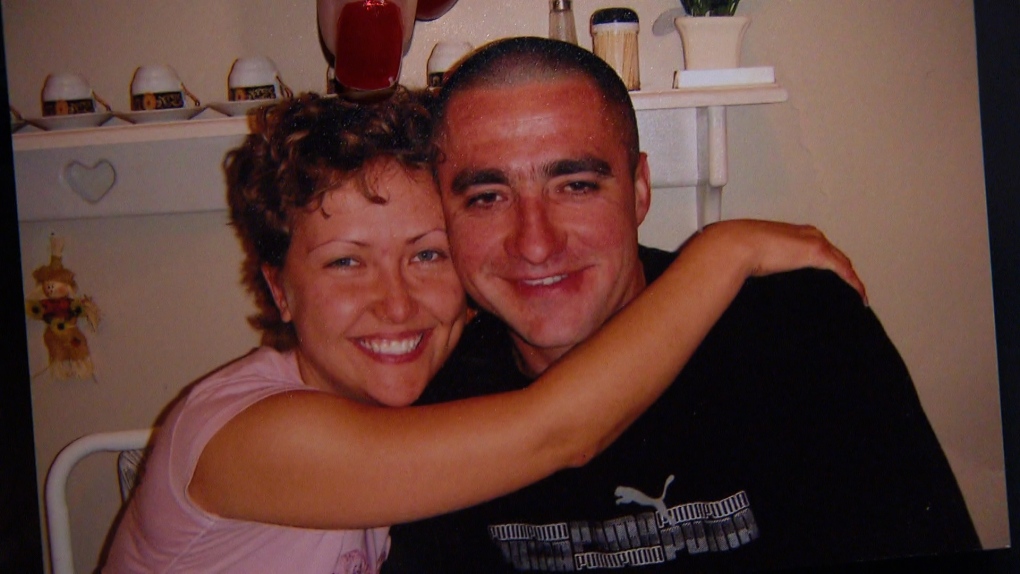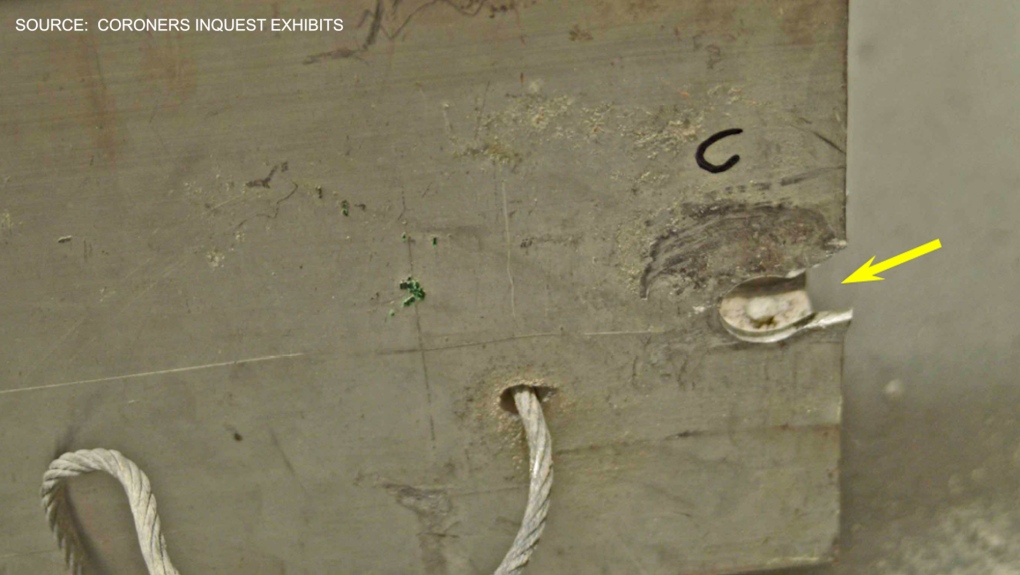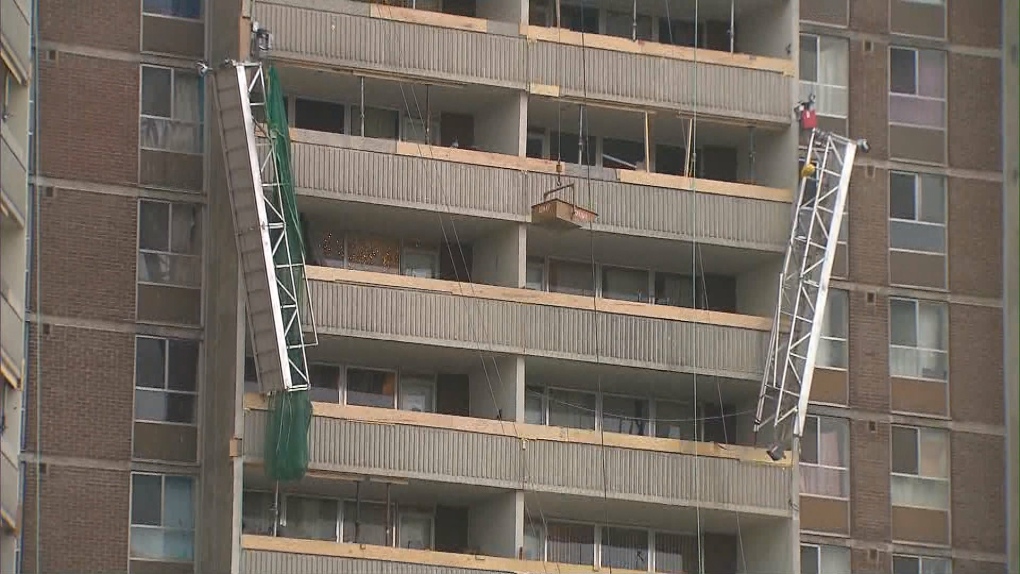'These guys keep dying': Widow calls for worker safety as inquest into deadly 2009 Toronto scaffolding collapse begins
A widow of one of the workers who plunged 13 storeys to their deaths at a Toronto highrise in 2009 told a coroner’s inquest in a statement she wants more to change to keep the industry safe.
The deaths of four workers after a swing stage gave way on Christmas Eve of that year sparked a sea change in how workers train and protect themselves at height.
“I hope you understand how great he was,” said Oksana Afanasenko, the wife of Aleksey Blumberg, in a statement read by coroner’s counsel, Jai Dhar. She said they had been married for just months when he was killed.
“I have a life after him. An amazing family. But it still hurts when I bump into the places or people that remind me of Alex, or when I see a swing stage downtown or flowers on construction sites because those guys still keep dying and it makes me cry. I hope you will do everything to change that tragedy,” she wrote.

Seventeen workers died on Ontario construction sites in 2009, according to the province’s Ministry of Labour. That rose to 22 in 2021, the figures show.
“Over the course of 12 years, that’s gone up. And you have to say to yourself, ‘what are we doing wrong?’ And, in my opinion, we are not doing proper inspections on workplaces,” said NDP Workplace Health and Safety Critic MPP Wayne Gates.
Fayzullo Fazilov, Alexsandrs Bondarevs, Vladimir Korostin, and Aleksey Blumberg died after the swing stage they were on suddenly collapsed on Christmas Eve in 2009.
The four men -- all employed by Metron Construction -- fell 13 storeys to the ground. Another worker was seriously injured, and a sixth -- who was tethered, as required under provincial law -- was left hanging in mid-air but wasn't hurt.
The coroner’s inquest heard that 16 of the welds in the swing stage were cracked and broken, and two provided no structural support at all.
“As a result of these deficiencies, the swing stage would not have been safe for two workers, let alone six workers with tools and equipment,” said coroner’s counsel, Jai Dhar.

An engineer who testified said it couldn’t be said that the swing stage was “designed” -- it was merely fabricated, because the flaws in the design were so severe.
On top of that, there were only two lifelines -- which workers can strap harnesses to -- for six people, the inquest heard.
The project manager, Vadim Kazenelson, survived after he managed to hold on to a balcony when the scaffolding fell.
Kazenelson was later convicted of four counts of criminal negligence causing death and one of causing bodily harm after an Ontario court found he was aware that protections against falls were not in place. He was sentenced to three-and-a-half years behind bars and his appeal was unsuccessful.
The company, Metron, was fined $750,000.
The incident sparked investigations, a report with dozens of recommendations, and new training requirements for workplaces across Ontario, said Enzo Garritano, the president of the Infrastructure Health and Safety Association.
“In the past, the regulations required training; now they require training to a standard,” he said, adding that the hardest part is making sure the training is reinforced the moment a new worker steps on the job.
“Complacency may set in and it’s about human nature, breaking through that,” he said.
Natasha Luckhardt of the Ontario Federation of Labour said the prosecution of Metron was based on a law passed after the Westray mining disaster in Nova Scotia, when an underground methane explosion killed 26 miners.
Criminal prosecutions there were not successful, and a public inquiry recommended making it easier to charge companies with criminal negligence.
But actually using that law is very rare, Luckhardt said, imploring police and other investigators to use it to investigate worker deaths, rather than just treating them as accidents.
“We send a letter every time someone is killed in a workplace, urging them to use the lens of the Westray law. In just this month we have sent letters to eight employers, because eight workers have been killed,” she said.
One worker’s family faced deportation after the 2009 incident -- a sign, advocates say, that more needs to be done to address the power imbalance between immigrant workers and Canadian companies.
“We see little legislative protections, poor enforcement, and concerns about reprisals,” said Chris Ramsaroop of Justice for Migrant Workers.
Ramsaroop called for more proactive inspections and to strengthen whistleblower protection laws.
The inquest was delayed by the multiple trials and appeals, and was also delayed from May 2020 due to the COVID-19 pandemic.
Dr. John Carlisle, the presiding coroner, said the inquest will look at what led to the deaths and a jury could make recommendations on avoiding similar situations in the future.
"It will be an occasion for the review of everything that has happened, how improvements have been made, and to reassure the public that all that has been done properly," he said.
"Legal responsibility and blame are not part of an inquest. That was the role of the courts. Those matters have long since been decided."
 Four workers were killed after scaffolding collapsed at a Kipling Avenue highrise on Dec. 24, 2009.
Four workers were killed after scaffolding collapsed at a Kipling Avenue highrise on Dec. 24, 2009.
CTVNews.ca Top Stories

BREAKING Sport court dismisses Canada's appeal in women's soccer case
The Court of Arbitration for Sport has dismissed Canada's appeal of a six-point penalty against its Olympic women's soccer team.
Man linked to four murders in Kirkland Lake, Ont., is dead, police say
Ontario Provincial Police say Martyn Rosko, the main suspect in four homicides in Kirkland Lake, is dead.
Want to move out of Canada? Experts explain everything you need to know
If you're planning to leave Canada, there's a laundry list of things that need to be checked off. Experts explain all the steps you need to take before making the move.
Colombian President Petro calls on Venezuela's Maduro to release detailed vote counts from election
Colombian President Gustavo Petro on Wednesday called on his close ally, Venezuelan President Nicolas Maduro, to release detailed vote counts of the weekend election in which electoral authorities declared Maduro the winner.
Starbucks sales tumble as customers reject high-priced coffee
Fewer people are going to Starbucks and buying drinks and food, as last quarter was Starbucks' second straight with a sales decline.
Vermont man evacuates neighbours during flooding, weeks after witnessing a driver get swept away
Weeks after Jason Pilbin witnessed a driver get swept away by floodwaters, his northeastern Vermont community was ravaged again by flooding from heavy rains.
Families seek answers after inmates' bodies returned without internal organs
Six families whose loved ones died in Alabama prisons have filed lawsuits against the commissioner of the state's department of corrections, saying their family members' bodies were returned to them missing internal organs after undergoing state-ordered autopsies.
Economy grew 0.2% in May, StatCan estimates 2.2% annualized growth in Q2
The Canadian economy continued to keep its head just above water in May, growing 0.2 per cent, led by expansions in manufacturing and the public sector.
'Severely hypothermic' sailor rescued after spending hours adrift off B.C. coast
A sailboat captain was found alive but suffering from a severe case of hypothermia on Monday after spending up to five hours adrift in the ocean off British Columbia, according to the coast guard.

































